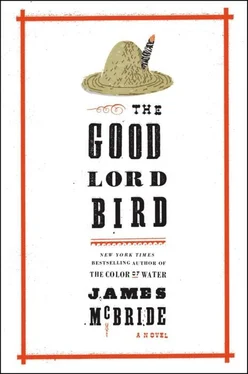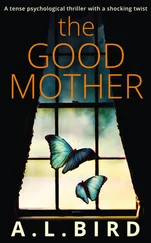I come to enjoy that first winter with the Old Man’s army, especially with Fred. He was as good a friend as a feller—or a girl who was really a feller—could want. He was more like a child than a man, which meant we fit together well. We never run short on playthings. The Old Man’s army stole everything from the Pro Slavers a child could want: fiddles, saltshakers, mirrors, tin cups, a wooden rocking horse. What we couldn’t keep, we used for target practice and blasted up. It weren’t a bad life, and I growed used to it and forgot all about running off.
Spring came on like it always did, and one morning the Old Man went out scouting by himself, looking for Pate’s Sharpshooters, and come back driving a big schooner wagon instead. I was setting by the campfire, making a fish basket when he rolled in. I looked up at the wagon as it rolled past and saw it had a busted-up back wheel with the hardwood brake shorn off. I said, “I knows that wagon,” and no sooner had I said it than Nigger Bob and five Negroes tumbled out the back.
He seen me right off, and while the rest tumbled out to follow the Old Man to the campfire to eat, he cornered me.
“I see you is still working your show,” he said.
I had changed over the winter. I had been out some. Seen a little bit. And I weren’t the meek little thing he had seen the fall before. “I thought you said you weren’t going to join this army,” I said.
“I come to live large like you,” he said happily. He glanced ’round, seen nobody was close, and then whispered, “Do they know you’re ... ?” and he done his hand in a wiggly way.
“They don’t know nothing,” I said.
“I won’t tell,” he said. But I didn’t like him having that on me.
“You plan on riding with us?” I asked.
“Not hardly. The Captain said he had but a few things to do and then we’s gone to freedom.”
“He’s riding against Captain Pate’s Sharpshooters.”
That floored Bob. “Shit. When?”
“Whenever he finds ’em.”
“Count me out. There’s two hundred in Pate’s army. Probably more. Pate got so many rebels wanting to join you’d think he was selling Calpurnia’s flapjacks. He’s turning ’em away. I thought Old Brown was working the freedom train. Riding north. Ain’t that what you said last fall?”
“I don’t know what I said then. I don’t remember.”
“That’s what you said. Said he was riding for freedom. Gosh darnit. What other surprises is around here? What’s his plan?”
“I don’t know. He don’t tell me. Whyn’t you ask him?”
“He favors you. You ought to ask.”
“I ain’t gonna ask him them things,” I said.
“Ain’t you angling on freedom? What you routin’ ’round here for then?”
I didn’t know. Up till then, escaping back to Dutch’s was in my plans. Once that changed, it was day-to-day living. I never was one to look too far past angling meat and gravy and biscuits down my throat. Bob, on the other hand, mostly had a family to consider, I reckon, and he had his mind on the freedom line, which weren’t my problem. I growed used to the Old Man and his sons. “I reckon being practiced on a sword and a pistol is what I been learning ’round here,” I said. “And reading the Bible. They do lots of that, too.”
“I ain’t come here to read nobody’s Bible and fight nobody’s slavery,” Bob said. “I come to get myself out from under it.” He looked at me and frowned. “I guess you don’t have to worry about it, the way you playing it, being a girl and all.”
“You the one that told me to do it.”
“I ain’t tell you to get me kilt!”
“You come here ’cause of me?”
“I come here ’cause you said the word ‘freedom.’ Sheesh!” He was mad. “My wife and children’s still in bondage. How I’m gonna plan on earning money to buy them if he’s monkeying ’round, fighting the Missourians?”
“You didn’t ask him?”
“There weren’t no asking,” Bob said. “My marse and I was rolling to town. I heard a noise. Next thing I know, he stepped out the woods holding a rifle in marse’s face. He said, ‘I’m taking your wagon and freeing your colored man.’ He didn’t ask me if I wanted to be free. Course I come along ’cause I had to. But I thought he was gonna free me to the north. Nobody said nothing about fighting nobody.”
That was the thing. The Old Man done the same to me. He reckoned every colored wanted to fight for his freedom. It never occurred to him that they would feel any other way.
Bob stood there, fuming. He was hot. “I done gone from the frying pan to the fire. Captain Pate’s rebels is gonna burn us up!”
“Maybe the Captain’ll find somebody else to fight. He ain’t the only abolitionist ’round these parts.”
“He’s the only one that counts. Cousin Herbert said there’s two companies of U.S. dragoons combing this country, looking for this outfit. That’s U.S. Army, I’m talking. From back east. That ain’t no posse. They gonna blame us for whatever he does when he’s caught, you can bet on it.”
“What we done wrong?”
“We here, ain’t we? If we’s caught, you can bet whatever they do to him, they’ll double the potion on the niggers. We’ll be in deep grease. You never thunk that, did you?”
“You didn’t sing that song when you told me to run with him.”
“You didn’t ask it,” Bob said. He got up, looking toward the campfire, where the smell of food beckoned. “Fight for freedom,” he said, sucking his teeth. “Sheesh.” He turned and spotted the bevy of stolen horses tied to the outer barrier, where several scouts stood. Looked to be at least twenty horses there and a couple of wagons to boot.
He looked at them and back to me. “Whose horses is those?”
“He always got a bunch of stolen horses around.”
“I aim to take one of them and get gone. You can come if you want.”
“Where to?”
“Jump across the Missouri, then find Tabor, Iowa. They say there’s a gospel train there. Underground Railroad. That’ll run you north to Canada. Distant country.”
“You can’t run a horse that far.”
“We’ll take two, then. The Old Man won’t mind one or two missing.”
“I wouldn’t snatch a horse from him.”
“He ain’t gonna live long, child. He’s crazy. He thinks the nigger’s equal to the white man. He showed that on the way here. Calling the coloreds in the wagon ‘mister’ and ‘missus’ and so forth.”
“So what? He does that all the time.”
“They gonna kill him for being so dumb. He ain’t right in his mind. Ain’t you seen that?”
Well, he had a point, for the Old Man weren’t normal. For one thing, he rarely ate, and he seemed to sleep mostly atop his horse. He was old compared to his men, wrinkled and wiry, but nearly as strong as every one of them except Fred. He marched for hours without stopping, his shoes full of holes, and was overall gruff and hard generally. But at night he seemed to soften some. He’d pass Frederick sleeping in his roll, lean over, and tuck the giant’s blanket roll tightly with the gentleness of a woman. There weren’t a dumb beast under God’s creation—cow, ox, goat, mule, or sheep—that he couldn’t calm or tame to touch. He had nicknames for everything. Table was “floor tacker,” walking was “tricking.” Good was “dowdy.” And I was “the Onion.” He sprinkled most of his conversation with Bible talk, “thees” and “thous” and “takest” and so forth. He mangled the Bible more than any man I ever knowed, including my Pa, but with a bigger purpose, ’cause he knowed more words. Only when he got hot did the Old Man quote the Bible exact to the letter, and then it was trouble, for it meant someone was about to walk to the quit line. He was a lot to deal with, Old Brown.
Читать дальше












